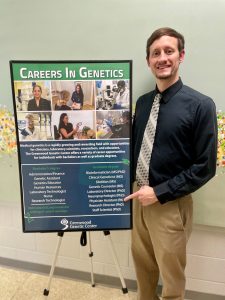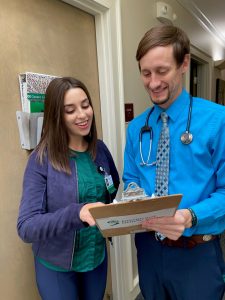Top 10 Things PAs Should Know About Genetics
From Rare Diseases to Privacy Law, Get Familiar with these Aspects of Genetics
June 28, 2022
By Laura Buch, MSPAS, PA-C, and Wesley Patterson, PhD, MSPA, PA-C


The Greenwood Genetic Center in Greenwood, South Carolina employs two PAs who practice in medical genetics: Laura Buch, MSPAS, PA-C, and Wesley Patterson, PhD, MSPA, PA-C, who are both passionate about genetics education. Learning more about patients’ genetic conditions, family histories, and dysmorphic features can help PAs know when to refer patients to genetics providers. Read on to learn about the top 10 things these experts believe PAs should know about their field.
1. Diversity and Genetic Variation Matter
We all know that humans have 46 chromosomes that carry over 20,000 genes. But did you know that humans are more alike than different? More than 99% of human DNA is the same from person to person, with less than 1% attributing to human variation. That 1% is very important and can provide the insight needed to understand human differences.
These differences (such as eye color, body structure, or the presence of a rare genetic disorder) are examined through population studies and research cohorts which strengthen our medical knowledge and improve our ability to care for each individual. While historically there has been a lack of diversity in research, today, efforts are being made to expand research participation to better represent individuals of all ethnicities, races, and genders.
For example, the National Institutes of Health’s All of Us Research Program is a longitudinal effort to gather health data from one million or more people to build one of the most diverse health information resources in history. The program aims to advance precision medicine research – which we use in genetics to ensure patients have the appropriate therapies, monitoring, and specialty care they need – by collecting genetic, environmental, and lifestyle data from participants of different backgrounds who reflect the diversity of the U.S.
2. It Runs in the Family
A patient’s family history holds important information about their past and future health, especially for inherited traits and conditions. Family members often have similar genetic backgrounds, behaviors, and environments. A thorough family history can help determine if a patient has an increased risk of developing certain common health conditions such as hypertension, heart disease, and type 2 diabetes, or genetic disorders, such as sickle cell disease and cystic fibrosis. A comprehensive family history includes information from three generations and can be recorded using a pedigree. Knowing if a condition runs in the family would prompt PAs to recommend appropriate genetic testing, screening, and guidance for their patients.
3. Start Early with Newborn Screenings
Also known as baby’s first test, newborn screening (NBS) is a blood test performed on every baby between 24 and 48 hours of life, in combination with a screen for critical congenital heart defects and a hearing test. NBS looks for changes in the blood that may suggest an underlying disorder. This test can be lifesaving, as children with certain life-threatening inborn errors of metabolism may appear normal at birth. Abnormal results trigger repeat testing to confirm the diagnosis.
The primary care provider is then alerted and will work with a metabolic specialist to coordinate further genetic and biochemical testing. If the diagnosis is confirmed, treatment begins. The panel of tests varies from state to state, and the addition of new conditions to a state’s testing panel is based upon federal recommendations, patient advocacy, state resources, and funding.
4. Know What’s Atypical
Dysmorphology is the study of anomalies or other differences in body structure. Dysmorphic features may be true anomalies, such as congenital heart defects, or simply atypical findings, such as widely spaced eyes. Congenital anomalies or atypical physical features may be associated with a genetic disorder. PAs do not need to be trained as dysmorphologists, but they do need to be able to recognize what is “typical” and “atypical.” A general rule of thumb is if a patient has two or more atypical findings present (e.g. congenital heart defect and developmental delay), they may have a genetic syndrome and a referral to medical genetics may be warranted.
[Stay up to speed with our clinical journal, JAAPA, free with membership]
5. Rare Diseases – Not so Rare
Hearing hoof beats? Consider zebras! Yes, individually, rare genetic conditions are just that – rare. Collectively, however, rare diseases affect one in 10 individuals. In the era of next generation DNA sequencing, rare genetic conditions are more easily and rapidly detected. This has ended the diagnostic odyssey for many and allowed for targeted treatment options, including participation in clinical trials. When a rare disorder is suspected, PAs should consider a referral to a genetics provider for consideration of genetic testing and coordination of care.
6. Pharmacogenetics is Gaining Popularity
Pharmacogenetics is a branch of precision medicine that involves looking at certain genetic changes to help determine the best medication and dosage for a specific patient. Genetic variants can cause individuals to metabolize certain medications differently, depending on the type of metabolizer they are (poor, intermediate, extensive/normal, or ultrarapid).
PAs can use pharmacogenetic testing to determine if a certain medication may be effective for a patient, select the best dosage, and predict if a patient may have a higher risk for serious side effects. Pharmacogenetic testing is becoming widely utilized throughout healthcare and can aid in managing therapies for conditions involving anticoagulation, epilepsy, chronic pain, psychiatric disorders, and many more.
7. Direct-to-Consumer Genetic Testing: Pros and Cons
Director-to-consumer (DTC) genetic testing can be ordered by an individual without the involvement of a healthcare provider. While many DTC tests provide information regarding genetic traits and ancestry, others can inform patients about future health risks by analyzing specific gene changes. DTC tests can be beneficial as they are relatively inexpensive and can identify if an individual has an increased risk of developing certain genetic conditions or if they are a carrier of a hereditary disorder.
One limitation of using DTC tests is that only specific predetermined genetic changes are analyzed, which means that some pathogenic changes may be missed. Additionally, PAs need to know that an abnormal DTC test should be confirmed with a diagnostic genetic test.
8. Understand the Legal Landscape
When counseling patients about genetic testing, it is important for PAs to consider the ethical ramifications of genetic testing. Genetic testing is complex, and in order for patients to make informed decisions, they should be aware of the potential benefits and limitations of the testing. For example, legislation such as the Genetics Information Nondiscrimination Act of 2008 (GINA) protects individuals from discrimination by employers or their health insurance companies on the basis of their genetic information or predispositions.
This can reassure patients who are concerned about the privacy of their information; however, GINA does have its limitations. It does not provide protections to those who are already exhibiting symptoms of a genetic disorder, to individuals employed by the government or military, or to employees of organizations with fewer than 15 employees. Protection also does not extend to life/disability insurance.

9. Fellow PAs in the Field
Genetics is a close-knit community. Currently, there are only 18 PAs practicing in the field of medical genetics, and we keep in close contact with each other. PAs in genetics work with patients in various settings, including general, metabolic, hereditary cancer, lysosomal storage disorders, and in other specialty genetics clinics. PAs are involved in the evaluation of individuals with suspected or known genetic disorders. We obtain a comprehensive perinatal, medical, developmental, and family history and perform a thorough physical exam, including a dysmorphology exam. If indicated, we order evidence-based genetic testing, coordinate care, and develop individualized treatment plans.
Are you interested in learning more about what it is like to work in genetics? Want to connect to others in the field? Visit the Society of PAs in Genetics and Genomics website and join today!
10. Check out These Genetics Resources
There are many resources available for PAs to utilize:
- Genetic-specific resources:
- MedlinePlus: Genetics
- GeneReviews®
- Genetics and Rare Disease Information Center
- Online Mendelian Inheritance in Man
- PharmGKB (Pharmacogenetics)
- Baby’s First Test (Newborn Screening)
- Genomics education resources:
- Where to find a genetics clinic or genetic counselor in your area:
Lastly, one final recommendation for PAs interested in genetics: Consider participating in and talking to patients about the All of Us Research Program! By getting involved, participants will not only help diversify the research base, but can also learn more about themselves through the program’s return of genetic results. Plus, PA researchers can check out the publicly available data on the All of Us Research Hub.
Laura D. Buch, MSPAS, PA-C, practices medical genetics at the Greenwood Genetic Center in Greenville, South Carolina. PA Buch’s work is focused around the diagnosis and treatment of patients with abnormal newborn screens, inborn errors of metabolism, and lysosomal storage disorders. She is involved in several onsite clinical trials. She can be reached at [email protected].
Wesley G. Patterson, PhD, MSPA, PA-C, practices medical genetics at the Greenwood Genetic Center in Greenwood, South Carolina. Patterson is the AAPA’s external representative in the practice area of genetics and genomics and a founding member of the Society of PAs in Genetics and Genomics, where he serves as treasurer and webmaster. He can be reached at [email protected].
You May Also Like
A Day in the Life of a PA in Genetics
Two PAs Use Genetics and Precision Medicine to Provide Answers and Develop Plans for Patients
The All of Us Research Program
Thank you for reading AAPA’s News Central
You have 2 articles left this month. Create a free account to read more stories, or become a member for more access to exclusive benefits! Already have an account? Log in.



